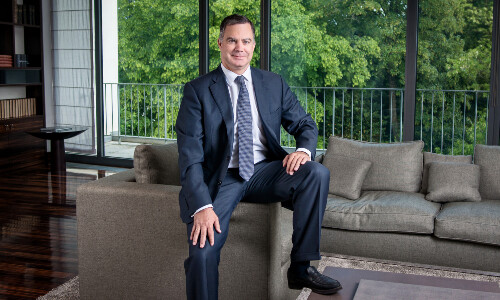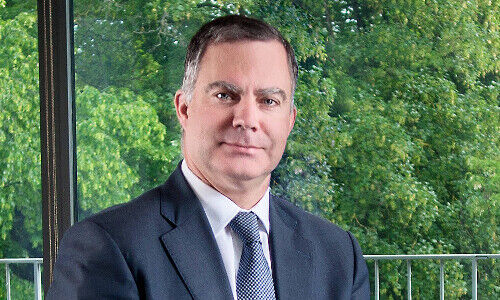It’s becoming increasingly clear that large banks aren’t necessarily more stable or secure than specialized private banks, says Marcos Esteve, CEO of Geneva-based Banque Heritage, in an interview with finews.com. As Credit Suisse fades into the sunset, he’s working to expand the family bank's offerings.
Marcos Esteve, Heritage originated as a family office. Why were there multiple developmental stages leading up to a bank?
When my brother Carlos Esteve started the company in 1986, my father recommended setting up systems – including IT, policies, and procedures – as if we were already a bank, even when there was no immediate need. With tighter regulations, Heritage later became a securities dealer, and 20 years ago, ultimately a bank.
Significant investments weren't required since we were already fully equipped. Over the past 35 years, we've expanded our services and offered more financial solutions, including loans, reaching a growing clientele.
Isn't a bank more of a burden today, given the increasing regulations?
Building trust and developing customer relationships is a long journey, requiring continuous effort, open communication, and keeping promises.
«As part of our growth, we consistently looked for potential acquisitions»
In this context, tightening regulations naturally come with additional costs. However, operating with a banking license offers added comfort and increased security for our clients.
Two families joining forces in banking is quite rare. How did this merger occur, and why did you seek mutual collaboration?
As part of our growth, we consistently looked for potential acquisitions and continually scan the market for opportunities. Just in the last ten years, we've completed several transactions, such as Bank Frey in Zurich, Standard Chartered in Geneva, Hottinger & Cie in Zurich, and Lloyds Bank in Uruguay.
Meeting with Sallfort Privatbank and the Barth family, we recognized numerous similarities between our families. The Esteve family ranks among the top five in the cotton, coffee, and cocoa business, while the Barth family is a leader in hops. Both families possess a profound entrepreneurial spirit with a history spanning 200 years.
«In an ever-changing world, private banking must continuously evolve»
To manage their wealth, both families founded their own family offices, which eventually evolved into banks. It was a natural step to combine our strengths to learn from each other and jointly pursue the primary objective: capital preservation. Through this merger, we expanded our presence in Switzerland with locations in Geneva, Basel, Zurich, and Sion, strengthening our capital base.
How has the culture of Banque Heritage changed since Sallfort Privatbank joined?
The merger with Sallfort Privatbank didn't bring about fundamental cultural changes since both families shared similar values and objectives. Our investment and service offerings complemented each other perfectly, allowing us to expand our investment solutions. It also enabled us to expand our presence in Switzerland and fortify our capital base.
Still, we remain a bank of manageable size with an entrepreneurial spirit and a solution-focused «can-do» attitude. We take satisfaction in meeting our client's challenges with appropriate solutions.
Does private banking need to be redefined for the 21st century?
In an ever-changing world, private banking must continuously evolve. Whether in banking secrecy, expanding services, or ongoing digitalization, we need to stay updated.
It's crucial to precisely understand our client's requirements and evolve with them, ensuring we optimally support them across generations, always offering the right solutions.
You also serve many families abroad. How have these families reacted to the turmoil surrounding Credit Suisse?
Credit Suisse built a reputation as an entrepreneurial bank. Amid their decline, we noticed not only existing customers increasing their assets with us but also new clients coming our way.
«Clients have become more demanding and no longer want to rely on just one person»
It's becoming increasingly clear that major banks are not necessarily more stable and secure than specialized private banks like ours.
Has the decline of Credit Suisse harmed the reputation of the Swiss financial market and Swiss banking?
Our federal government reacted promptly to the situation and implemented effective measures. This ultimately served to protect the clients of Credit Suisse and preserve the recognized reputation of the Swiss financial sector, which continues to be perceived as resilient, stable, and reliable.
What lessons can be drawn from the decline of Credit Suisse for private banking?
My grandfather used to say: «Volume is vanity; profitability is sanity». Many large institutions seem to have lost sight of this principle. In a family business like ours, we are always focused on running the business for the next generation. This includes continuous risk and reputation management. Additionally, we strive to avoid conflicts of interest.
The goal is always to establish long-term and trustful relationships with our clients, which ultimately translates to sustainable growth. This holds not just in private banking.
How has the family office business that your bank offers changed over the years?
Following the financial crisis of 2008, banking regulations tightened over the past decade. This prompted many bankers to leave traditional institutions and start their investment advisory firms. Yet even these advisors couldn't permanently escape stricter rules. It remains to be seen how many can cope with the increased administrative burden and associated costs. Moreover, there's a question of whether these advisors, with their limited structures, can continue to offer genuine wealth management.
«Joining Banque Heritage should thus be a seamless ‹plug and play› experience»
Clients have become more demanding and no longer want to rely on just one person. An institution like ours, founded with a clear purpose and employing a team of experienced specialists, offers the right blend of stability and expertise. This alignment of interests creates the ideal conditions for preserving and growing wealth across generations.
What are your next developmental steps – are you following a strategy?
We are currently in discussions with several investment advisors who are considering affiliating with us. The main reason is their approval process with Finma is taking longer than initially anticipated, and the outcome remains uncertain.
Our platform provides a solid foundation for developing tailored investment solutions for their clients. Additionally, we maintain partnerships with a network of over ten custodian banks that can assist us with onboarding. Joining us should be a seamless «plug and play» experience, where advisors directly benefit from our institution's flexibility and high service standard.
What initiatives can we expect this year?
We've started to specifically expand our offerings, focusing more on entrepreneurs and executives who desire a proactive financial partner. We've identified this need among both our existing clients and our network.
In line with the concept of a Single-Family Office offering its established services to other families, we position ourselves as entrepreneurs and deliberately target this new demographic.

Marcos Esteve joined Banque Heritage in 2006 and held several key senior management positions before being named CEO in July 2017. Before joining Heritage, he was Chief Financial Officer at a leading firm in the global fashion industry. He started his professional career in the corporate internal audit division of Nestlé’s Swiss headquarters. He holds a Master’s degree in Business Information Systems from the University of Lausanne, HEC as well as a Master’s degree in Economics, majoring in Business Administration from the same establishment.



































